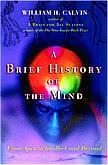| posted 1 September 2003 |
|
COPY-AND-PASTE CITATION William H. Calvin, A Brief History of the Mind (Oxford University Press 2004), readings. See also http://WilliamCalvin.com/BHM/readings.htm |
William H. Calvin |
|
Recommended Reading There are many good books on the paleoanthropology suitable for general readers. A few of my recent favorites are: Donald Johanson and Blake Edgar, From Lucy to Language (Simon & Schuster 1996). Has excellent photographs, mostly by David Brill. Ian Tattersall, Becoming Human (Harcourt Brace 1998). Ian Tattersall, The Monkey in the Mirror: Essays on the Science of What Makes Us Human (Harcourt Brace 2001). Alan Walker and PAT SHIPMAN, The Wisdom of the Bones (Knopf 1996). Books more specifically concerned with language and the transition to the modern mind: William H. Calvin, Derek Bickerton, Lingua ex Machina: Reconciling Darwin and Chomsky with the Human Brain (MIT Press 2000). Terrence W. Deacon, The Symbolic Species : The Co-Evolution of Language and the Brain (Norton 1997). Merlin Donald, A Mind So Rare: The Evolution of Human Consciousness (Norton 2001). Robin Dunbar, Grooming, Gossip, and the Evolution of Language (Harvard University Press 1996). Nicholas Humphrey, A History of the Mind (Simon & Schuster 1992). Ray Jackendoff, Patterns in the Mind : Language and Human Nature (Harpercollins 1994). Richard G. Klein and Blake Edgar, The Dawn of Human Culture (Wiley 2002). Melvin Konner, The Tangled Wing: Biological Constraints on the Human Spirit (W. H. Freeman 2001). Steven Mithen, The Prehistory of the Mind: The Cognitive Origins of Art, Religion, and Science (Thames and Hudson 1996). John E. Pfeiffer, The Creative Explosion (Harper and Row 1982). To read more about the behavioral commonalities seen in the great apes, start with: Christophe Boesch, Hedwige Boesch-Achermann, The Chimpanzees of the Tai Forest: Behavioural Ecology and Evolution (Oxford University Press 2000). Frans de Waal, Good Natured: The Origins of Right and Wrong (Harvard University Press 1996). Together with his other books for general readers, such as The Ape and the Sushi Master, Bonobo, Peacemaking Among Primates, and Chimpanzee Politics, you get a good view of what the ape-human transition might have been from. Frans de Waal, editor, Tree of Origin: What Primate Behavior Can Tell Us about Human Social Evolution (Harvard University Press 2001). Michael P. Ghiglieri, East of the Mountains of the Moon: Chimpanzee Society in the African Rain Forest (Collier 1988). Marc D. Hauser, Wild Minds (Holt 2000). Sarah Blaffer Hrdy, Mother Nature : A History of Mothers, Infants, and Natural Selection (Pantheon Books 1999). Alison Jolly, Lucy's Legacy : Sex and Intelligence in Human Evolution (Harvard University Press 1999). E. Sue Savage-Rumbaugh, Stuart Shanker, Apes, Language, and the Human Mind (Oxford University Press 1998). Craig B. Stanford, The Hunting Apes (Princeton University Press 1998). Richard Wrangham, Dale Peterson, Demonic Males: Apes and the Origins of Human Violence (Houghton Mifflin 1996).
For evolution and cognition more generally: William H. Calvin, A Brain for All Seasons: Human Evolution and Abrupt Climate Change (University of Chicago Press 2002). Helena Cronin, The Ant and the Peacock (Cambridge University Press 1992). Richard Dawkins, Climbing Mount Improbable (W. W. Norton 1996). Daniel C. Dennett, Darwinís Dangerous Idea (Simon & Schuster 1995). Daniel C. Dennett, Freedom Evolves (Viking 2003). Gilles Fauconnier, Mark Turner, The Way We Think: Conceptual Blending and The Mind's Hidden Complexities (Basic Books 2002). Mark Johnson, Moral Imagination : Implications of Cognitive Science for Ethics (University of Chicago Press 1993). Steven Pinker, The Blank Slate: The Modern Denial of Human Nature (Viking 2002). Elliott Sober, David Sloan Wilson, Unto Others: The Evolution and Psychology of Unselfish Behavior (Harvard University Press 1998). Michael Tomasello, The Cultural Origins of Human Cognition (Harvard University Press 2000). Mark Turner, The Literary Mind (Oxford University Press 1996). Edward O. Wilson, Consilience (Knopf 1998). Adam Zeman, Consciousness (Yale University Press 2003).
For brain
side of things, start with Deacon (1997) and my earlier books,
The Cerebral Code, How Brains Think, and
Conversations with Neilís Brain (with George Ojemann). The glossary in A Brain for All Seasons will be helpful (see WilliamCalvin.com/BrainForAllSeasons/glossary.htm). For language issues, see the glossary for Lingua ex Machina (at WilliamCalvin.com/LEMglossary.html).
|
2000 The Cerebral Code 1996 How Brains Think 1996 Conversations with Neil's Brain 1994 The River That Flows Uphill 1986 The Throwing Madonna 1983 |
copyright ©2003 by William H. Calvin
| William H. Calvin |








